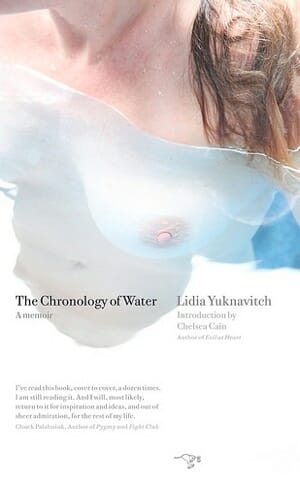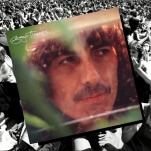The Chronology of Water by Lidia Yuknavitch

Despite what a growing (if dissonant) chorus of literary critics might have you believe, you do not have to choose between the novel and the memoir. Neither will supplant the other, and there will continue to be published fine and not-so-fine examples of each. Yet the war rages on. The novel is declared dead. Again. This time, the memoir is supposed to have killed it.
Civil wars are historically among the most bloody, and this one’s no exception. Though plenty of writers have written good novels as well as first-rate memoirs, the fire coming from both directions is less than friendly. On one side is David Shields and his starving army. In Reality Hunger: A Manifesto, he writes, “Novel qua novel is a form of nostalgia,” and, “The kinds of novels I like are ones which bear no trace of being novels.”
Them’s fightin’ words, and Lorrie Moore, for one, is not going to take them sitting down. Author of last year’s much-lauded but actually insubstantial novel A Gate at the Stairs, Moore takes to the pages of The New York Review of Books to launch a counter-attack under the guise of considering three recent memoirs. Moore trades in Shields’s laconic, aphoristic style for something more shrill and sarcastic, but the thrust of her argument mirrors his exactly. In her conclusion to the analysis of one memoir, she argues that the writer would have done better to write a novel instead: “a novel, where such inner lives can indeed be recreated or at least imagined with specificity: ironically, the genre of the novel, with its subtle characterizations and rich and continuous dreamscape, remains a kind of gold standard for a genre that may be usurping it.” This “gold standard” is, of course, her own, as she’s just defined it. In other words, the memoirs that she likes are ones which bear no trace of being memoirs.
Moore isn’t alone. There is a certain, unfortunate, and oft-promulgated school of thinking that a memoir should be nothing more than a truth-novel. That’s what I was taught in graduate school, until I took a workshop with Phillip Lopate, who argues persuasively for the conventions that are indigenous to memoir and essay. In a “Comments on the Form” essay for the nonfiction literary magazine Fourth Genre, Lopate deplores the chestnut, “Creative nonfiction is the application of fictional devices to memory.” This denies nonfiction its special access—indeed its inalienable reliance on—meditation and contemplation. The memoirist doesn’t simply recount and recreate her experience as if she’s the first-person narrator of a novel that happens to be true. She also makes sense of that experience. As Lopate writes, “There is nothing more exciting than following a live, candid mind thinking on the page, exploring uncharted waters.” A novel’s protagonist may be captain of her ship, but a memoirist, a good one at least, is also cartographer.
Speaking of water … as its title suggests, Lidia Yuknavitch’s fierce new memoir, The Chronology of Water (blurbed by Shields, among several eminent authors) takes place entirely off-shore, metaphorically speaking. Nothing about her life has followed the map. If the memoir has been under attack recently for recounting the same sad stories again and again, Yuknavitch has hit the tragedy trifecta. Her tale comprises incest, addiction, and a dead baby—plus, she’s a former athlete and occasional lesbian. Defenders of the memoir genre often point to its outliers, the ones doing something different, telling that one story that still hasn’t been told. No such luck with The Chronology of Water. But perhaps this hat trick of woe also would have made it impossible for Yuknavitch simply to novelize her past, as Moore might have advised. No fictional protagonist can realistically overcome that much. So, memoir it is.
One thing memoir does share with the novel? It isn’t what you say, it’s how you say it. So, sure, other people were sexually abused as children. Others have succumbed to the numbing powers of illicit substances. Babies die every day. And plenty have written about it. While I can’t say Yuknavitch does it the best, because I’m rarely moved to read an incest or addiction or dead baby narrative, and thus have little basis for comparison I will say this: She does it damn good.
I’m using damn good with intention. This book is good, no doubt, but it is also damning. Without fashioning itself as a critique of society, but just by telling a story of one woman, of one daughter, of one swimmer through water and life and words, it excoriates. Yuknavitch speaks frankly of crimes which most of us would have preferred to call unspeakable and leave it there. These many crimes of family go unpunished, and forgiveness fails, not because it isn’t granted but because it isn’t enough. How could it be, when time and again, the architect father grossly violates, and the real-estate-agent mother grossly neglects? In one excruciatingly vivid scene, the father drags his family up a deadly snowy Mt. Rainier to cut down a Christmas tree. Lidia falls behind, bluely hypothermic, and is (for once) tenderly ministered to by her mother. When he finally returns with her silent, shivering sister, she “looked like her legs didn’t work right.” Yuknavitch has this terrible talent for choosing the right, most crushing detail. Witness the mother after she tries to off herself with vodka and pills while Lidia quite literally stands by, tears and questions in her young eyes. Her mother’s terse response: “Stay away; this isn’t anything for you. I’m not talking about anything.” Why make up dialogue when you have material like that?
The memoir-as-truth-novel would, at that point, simply move on to the next chilling scene, perhaps one that shows how the mother’s suicide attempt has damaged the daughter. But Yuknavitch exploits that ruminative potential of the genre by moving from the child’s perspective to the adult’s, wherein she does the doubtlessly painful work of locating her mother within herself: “I didn’t know yet how wanting to die could be a bloodsong in your body that lives with you your whole life. I didn’t know then how deeply my mother’s song had swum into my sister and into me….I didn’t know we were our mother’s daughters after all.”
-

-

-

-

-

-

-

-

-

-

-

-

-

-

-

-

-

-

-

-

-

-

-

-

-

-

-

-

-

-

-

-

-

-

-

-

-

-

-

-








































